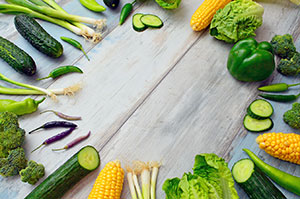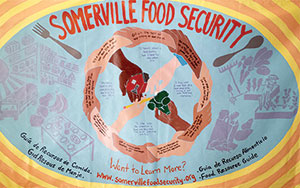
Food-insecure communities are depending on several socially concerned nonprofit organizations to get them through the hard times they are contending with in the wake of the COVID-19 pandemic.
By Max Eidelman
Despite the tumult of the past year, we still find ourselves in the season of giving right now. In fact, it is no exaggeration to say that it is more important now than it has been in recent history to give to those in need.
This year has been difficult everyone, and folks who have been hit especially hard are the food-insecure people who rely in part on food donations and volunteer efforts to feed themselves and their families.
In a recent interview, Lisa Brukilacchio, a member of the Cambridge Health Alliance and Director of the Somerville Community Health Agenda, spoke about the importance of volunteer efforts during the pandemic and how members of the community can help.
According to Brukilacchio, a comprehensive list of what to donate and how to help can be found on the Somerville Food Security Coalition’s (SFSC) website, somervillefoodsecurity.org. One of the most important things people and organizations can give is simply money. Some of the funds and groups that can make the most of monetary donations include: the Somerville Cares Fund, the Welcome Project Immigrant Assistance Fund, Mutual Aid of Medford and Somerville (“MAMAS”), and Community Cooks, among other programs.
 Local food pantries, such as Project Soup and Shepherds Kitchen, will also benefit from monetary donations. The SFSC website provides links to the websites of these organizations and others, with details for how to donate money.
Local food pantries, such as Project Soup and Shepherds Kitchen, will also benefit from monetary donations. The SFSC website provides links to the websites of these organizations and others, with details for how to donate money.
Brukilacchio explained that one of the most effective means of helping vulnerable households during the pandemic has been delivery services. During the winter months, the need for delivery will inevitably increase, which of course will increase the need for volunteers.
People can volunteer through Somerville’s SomerServe Program, the details of which can be found on the city’s website or by contacting the Community Services Manager, Jennifer Mancia, at jmancia@somervillema.gov. One can also volunteer through the MAMAS program, the details of which are available on the MAMAS’ website. Again, the SFSC site provides links to these and other organization’s websites.
Of course, food donations are of immense value to food-security efforts as well, but with Covid-19 safety protocols in place, it’s imperative to follow the guidelines that individual pantries advise. If you would like to make a food donation, then please contact the local food pantry or pantries you’d like to donate to, such as Project SOUP, Elizabeth Peabody House, Shepherd’s Kitchen, and Food4All.
The contact information for these organizations can be found online and is available on the SFSC website as well. The SFSC website provides a list of non-food items that are in need right now, some of which are disinfecting wipes, sanitizer, toilet paper, diapers, toothpaste, and other such hygiene products. These items can be dropped off at Project Soup, located at 165 Broadway in Somerville. These items and groceries as well can be dropped off in a box at the City Hall annex, located at 50 Evergreen Avenue.
This time of the year should always be one of giving, to loved ones but to those in need as well. Covid-19 only increases the need to donate, and despite optimism for a vaccine, those among the food-insecure population will still only face further challenges as the winter progresses.
One metric that Brukilacchio referred to which captures the need for donations is the fact that since 2018, Massachusetts has seen a 59% increase in food-insecurity, the highest in the country. You can do your part to help by donating items or volunteering your time. For further details about how to help, please visit somervillefoodsecurity.org, where you can also find information about the work Brukilacchio and others have done for food-security efforts during the Covid-19 crisis.















Reader Comments